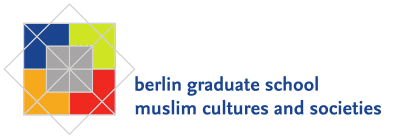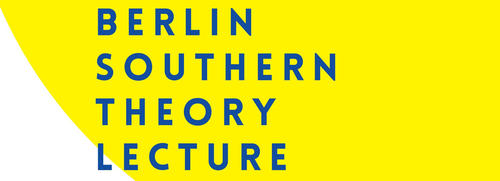Institute of Social and Cultural Anthropology
Medical Anthropology | Global Health
14195 Berlin
About the Research Area Medical Anthropology | Global Health
The Medical Anthropology | Global Health research area is dedicated to exploring the diversity of medical and health-related practices, institutions and forms of knowledge worldwide. Drawing on perspectives from critical medical anthropology and social science theories and methods, we analyse how these practices, forms of organisation and ideas are interwoven with local and transnational power relations. A further focus is on the changes in physical and mental wellbeing and the associated forms of medicine and healing in the context of globalisation and the political and economic transformation of healthcare systems.
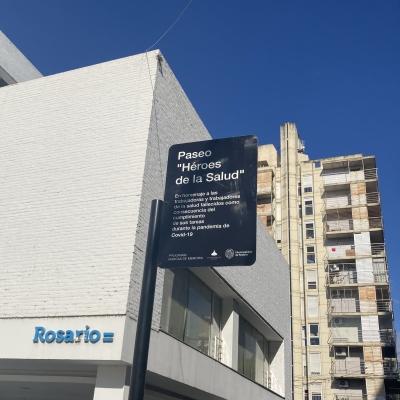
“Health heroes": Honoring healthcare workers who died during the COVID-19 pandemic. Photo: Tom Lagodny. 2024 Rosario, Argentina.
Main Research Areas
In the broader field of Global Health, we focus on the critical examination of measures to contain epidemics and pandemics such as HIV/AIDS or Covid-19, which have had, and in some cases continue to have, profound social, cultural and political effects worldwide. A central aspect of our work is the analysis of the social inequalities that are exacerbated by such health crises, as well as the role of care and social and cultural participation in this context, which are at the centre of activist struggles, among others. We also look at how global health interventions are accelerating digital and other technological transformations, creating new challenges but also opportunities for both health care and scholarly and/or transdisciplinary collaborations themselves. These developments challenge long-established structures, boundaries and ways of doing research in the field of global health, which are often rooted in colonial power and dependency relations.
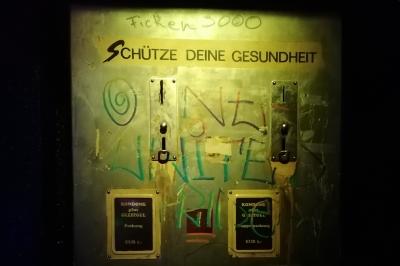
With the rise of pharmaceutical HIV prophylaxis, an out-of-use condom vending machine at a gay bar reflects shifting sexual health practices. Photo: Max Schnepf, 2022, Berlin, Germany.
Another field of research is the link between mobility, migration and health and medicine. On the one hand, we analyse the cross-border movements of patients, health professionals and healing practices as well as the global circulation of pharmaceutical products and alternative healing approaches. On the other hand, we focus on the emergence of transnational pharmaceutical and healing markets that reflect social hierarchies, class-based lifestyles and local appropriation processes. Finally, we conduct research on the reorganisation of reproductive relations and practices in the context of demographic, epidemiological and technological transformations. We analyse how all these developments are closely interwoven with political and economic interests on a global level and what effects they have on local life realities as well as on processes of social differentiation and inequality.
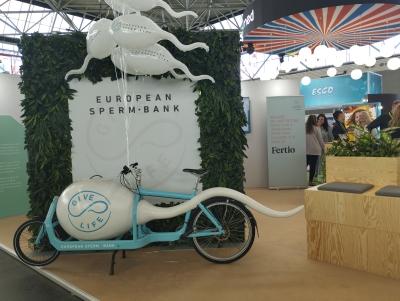
The “Sperm Bike”, a cargo bike specially designed for the transportation of cryopreserved sperm, advertises a Danish sperm bank in the exhibition area of a congress on reproductive medicine. Photo: Anika König, 2024, Amsterdam, Netherlands.
Interdisciplinarity and Networks of Collaboration
The Medical Anthropology | Global Health research area addresses the mutual constitution of health/medicine/biology and society/culture/politics, whereby our research focuses in particular on postcolonial power relations, knowledge hierarchies and divergent moral, affective and political-economic positionings. We incorporate findings from neighbouring fields such as religious, economic, political, environmental and legal anthropology, anthropological gender and sexuality studies as well as science and technology studies. Our research is closely embedded in national and international networks and is also characterised by diverse collaborations] with institutions and actors in Berlin, in German-speaking countries and worldwide.
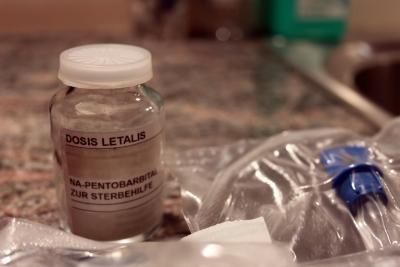
Sodium pentobarbital is the drug of choice for assisted dying procedures in Switzerland. The preparation of the drug was about to begin. Photo: Marcos Freire de Andrade Neves, 2015, Basel, Switzerland.
